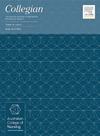高职护生父母教养方式与学习投入:自我同情的中介作用
IF 1.7
4区 医学
Q2 NURSING
引用次数: 0
摘要
学习参与是高职护生专业发展的必要条件。父母教养方式对学生的学习成绩和个人发展有显著影响。同样,自我同情可以增强情绪弹性,改善应对策略,潜在地增加学习投入。然而,对这些因素影响的研究,特别是在中国的背景下,仍然很少。目的探讨父母教养方式对高职护生学习投入的影响,探讨自我同情的中介作用,并强调这一机制在护理教育中的重要性。方法采用电子问卷的方式收集数据,包括人口统计资料、《中国大学生工作投入量表》、《乌得勒支学生工作投入量表》和《自我同情量表》。描述性相关研究和结构方程模型用于数据分析,在p <下确定显著性;0.05.积极的父母教养方式在不同年级、父母教育程度和家庭类型之间存在显著差异,而消极的父母教养方式在性别、居住地和母亲教育程度方面存在差异。结构方程模型显示,自我同情部分中介了父母教养方式对学习投入的影响,积极父母教养方式的中介效应为22.7%,消极父母教养方式的中介效应为24.1%。积极的父母教养方式通过自我同情直接或间接地对学习投入产生积极影响。相反,消极的养育方式有直接和间接的负面影响,也由自我同情介导。结论高职护生的父母教养方式总体上是积极的,但有提高自我同情和学习投入的潜力。本研究建议“护理导向干预方案:高职护生自我同情训练”来改善这些方面。本文章由计算机程序翻译,如有差异,请以英文原文为准。
Parenting styles and study engagement among higher vocational nursing students: The mediating role of self-compassion
Background
Study engagement is essential for the professional development of nursing students in higher vocational education. Parenting styles have been shown to significantly affect students’ academic performance and personal development. Similarly, self-compassion enhances emotional resilience and improves coping strategies, potentially leading to increased study engagement. However, research on the impact of these factors, especially in the context of China, remains scarce.
Aim
To examine how parenting styles influence study engagement among higher vocational nursing students, investigate the mediating role of self-compassion, and highlight the importance of this mechanism in nursing education.
Methods
Data were collected via an electronic questionnaire, including demographic profiles, the Short-form Egna Minnen av Barndoms Uppfostran for Chinese, the Utrecht Work Engagement Scale – Students, and the Self-Compassion Scale. Descriptive correlational studies and structural equation modelling were used for data analysis, with significance determined at p < 0.05.
Findings
Positive parenting styles varied significantly across grade levels, parental education, and family types, while negative parenting styles differed by sex, place of residence, and mother’s education. Structural equation modelling revealed that self-compassion partially mediated the impact of parenting styles on study engagement, with a mediation effect of 22.7% for positive parenting styles and 24.1% for negative parenting styles.
Discussion
Positive parenting styles directly and indirectly positively influenced study engagement through self-compassion. Conversely, negative parenting styles had direct and indirect negative impacts, also mediated by self-compassion.
Conclusion
Parenting styles for higher vocational nursing students are generally positive, but there is potential to enhance self-compassion and study engagement. The study recommends a ‘Nursing-led Intervention Program: Self-Compassion Training for Higher Vocational Nursing Students’ to improve these aspects.
求助全文
通过发布文献求助,成功后即可免费获取论文全文。
去求助
来源期刊

Collegian
NURSING-
CiteScore
2.70
自引率
6.70%
发文量
127
审稿时长
72 days
期刊介绍:
Collegian: The Australian Journal of Nursing Practice, Scholarship and Research is the official journal of Australian College of Nursing (ACN).
The journal aims to reflect the broad interests of nurses and the nursing profession, and to challenge nurses on emerging areas of interest. It publishes research articles and scholarly discussion of nursing practice, policy and professional issues.
Papers published in the journal are peer reviewed by a double blind process using reviewers who meet high standards of academic and clinical expertise. Invited papers that contribute to nursing knowledge and debate are published at the discretion of the Editor.
The journal, online only from 2016, is available to members of ACN and also by separate subscription.
ACN believes that each and every nurse in Australia should have the opportunity to grow their career through quality education, and further our profession through representation. ACN is the voice of influence, providing the nursing expertise and experience required when government and key stakeholders are deciding the future of health.
 求助内容:
求助内容: 应助结果提醒方式:
应助结果提醒方式:


